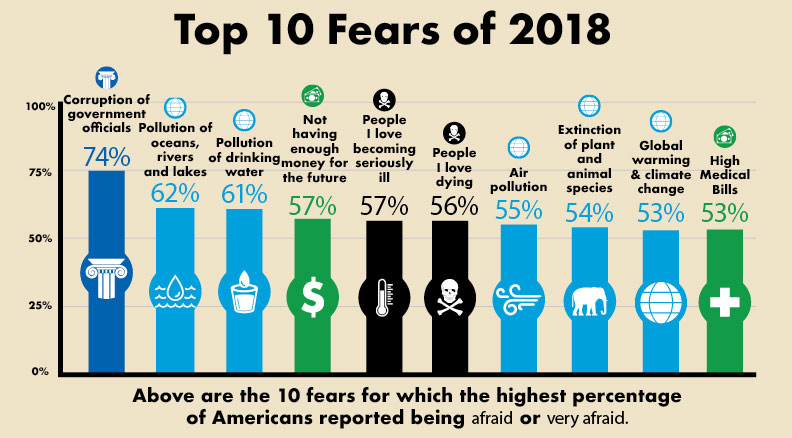Do you worry about corrupt government officials? Fret that the water you drink or the ocean, river or lake where you swim is polluted? If so, you have plenty of company. Americans are growing increasingly afraid of these and other threats, according to the fifth annual Chapman University Survey of American Fears.
For the first time since the survey began in 2014, a majority of respondents are afraid of each of the top 10 items in the fear list. The findings reflect Americans’ rising anxiety and changing views about the dangers that they say impact their lives now, say the three principal investigators for the survey. Researchers connect the uptick to the election of President Trump.
“It is worth noting that the fears regarding corruption and the environment have increased significantly following the election of President Trump in 2016 and all top 10 fears continue to reflect topics often discussed in the media,” said Christopher Bader, Ph.D., professor of sociology.
Government corruption continues as Americans’ top concern. But for the first time, environmental worries rose enough that they now represent half of the top 10 fears in the survey. Researchers credit extreme weather events, the Trump’s administration’s pullback on environmental protections and the economy for the greener attitudes.
A Wave of Green?
“In good economic times you’ll see fears like the environment popping up, whereas if we were having a dire economic situation, we would expect more economic fears to be on the list,” said Ann Gordon, Ph.D., professor of political science and one of three principal investigators for the survey.
Researchers also noted that most Americans don’t believe that immigrants are more likely than U.S. citizens to commit crime. In addition, Americans are less fearful of Muslims in American society than was indicated in previous surveys — a contrast with some of the debate driving political campaigns leading into the 2018 midterm elections.
“Two years ago, one out of three Americans thought immigration from Muslim countries should be banned, now that’s one out of five. The majority of American are not afraid of illegal immigration. Two out of three Americans do not want a border wall,” said Ed Day, Ph.D., professor and chair of the Department of Sociology.
Divisions Still Dominate
The findings were drawn from the responses of 1,190 adults in summer 2018. While they offer immediate insights into the nation’s collective mindset as Americans head to the polls next month, the findings also raise a set of unique and ongoing concerns for the researchers.
“What frightens Republicans the most doesn’t even register for Democrats, and vice versa. We see that bifurcation increasing, and that frightens me,” Bader said during an Oct. 12 talk at Chapman’s Family Homecoming Celebration.
Ultimately, the researchers hope that the survey’s longitudinal data over time might foster better reporting and policymaking, as well as improved awareness and understanding of proven threats.
For more on the survey results, including data graphics and findings related to disaster preparedness, money and medical bills, visit www.chapman.edu/fearsurvey.




